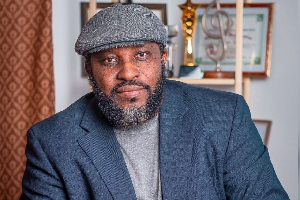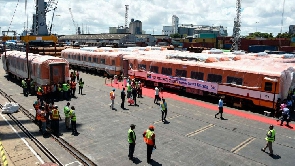Finance ministers from Tanzania and Zanzibar have embarked on fundraising for the standard gauge railway (SGR) project in the wake of the main contractor, Turkish firm Yapi Merkezi, showing signs of financial distress.
This has raised concerns of further delays on the first three phases of the 2,100-km railway seen as crucial to place Tanzania in position as a key trade corridor for East and Central Africa.
Tanzania’s Finance Minister Mwigulu Nchemba was on a European tour over the past fortnight, during which he held talks with officials in several countries regarding their possible involvement in the SGR project, whose estimated total cost upon completion is $10.4 billion.
The EastAfrican has learnt that Nchemba’s efforts drew tentative pledges from Spain and Sweden.
Zanzibar Finance Minister Saada Mkuya managed to canvass a similar commitment from the African Development Bank (AfDB), which is willing to provide over $3 billion for the project.
Questions about the ultimate fate of the SGR, which Tanzania sees as a launch pad for stronger transit trade ties with inland neighbour countries using the Central Corridor, came up after reports emerged from Turkey of a tug-of-war between the Yapi Merkezi company and its workers assigned to the project in Tanzania.
The company, in partnership with Portuguese firm Mota-Engil Africa, was awarded Lots 1, 2 and 3 of the projects covering a total of 1,090 km from Dar es Salaam to Tabora. Official reports say while Lots 1 and 2 (Dar-Morogoro-Makutupora) are almost complete, the third lot (Makutupora-Tabora) had reached 67 percent completion by the time the Turkish firm reportedly started having financial problems.
During his visit to Stockholm, Mr Nchemba on September 27 gave assurances that the project was progressing well, and the first two phases being handled by Yapi and Mota-Engil were at 98 percent and 95 percent complete, respectively.
It was the first formal statement by any Tanzania government official on recent developments in Turkey in the face of a wall of silence erected by the Works Ministry, Tanzania Railway Corporation, the SGR project coordination department, and Yapi Merkezi representatives when approached for comment on the unfolding events in Istanbul.
Phone calls and text messages to Works Minister Innocent Bashungwa, TRC director-general Masanja Kadogosa and SGR project coordinator Machibya Kadogosa (no relation to the DG) have all gone answered for two weeks.
Physical visits to the TRC and Yapi Merkezi offices in Dar es Salaam did not yield much, with an official at the office, who asked not to be identified, expressly stating that the firm’s contract terms with the government prohibited it from commenting publicly on the project.
Remaining phases
In Stockholm, Mr Nchemba held talks with representatives of Sweden’s Export Credits Guarantee Board (EKN), which is understood to have acted as guarantor for several banks that sponsored Lots 1 and 2 of Tanzania’s SGR.
He asserted that initial test runs for the Dar-Morogoro-Makutupora stretch would proceed as scheduled in December this year. The test runs were postponed several times this year without proper explanation and were last scheduled for August, only to be pushed back.
The minister told EKN officials that Tanzania was seeking funding for Lots 3 and 4, which will cover 501 km from Makutupora to the Isaka dry port; Lot 3 being the one that Yapi currently appears to be having trouble finishing.
On an earlier stopover in Madrid on September 22, Mr Nchemba met with Spain’s Deputy Minister for Industries, Trade and Tourism Xiana Mendez, who pledged support for the SGR project in the form of loans, loan guarantees and insurance for Spanish companies that win tenders for the remaining phases of the railway that have not yet been contracted out.
According to Ms Mendez, these include Lots 3, 4 and 5 from Makutupora to Mwanza and a planned additional strip from Tabora to Kigoma. At least $3.24 billion will be required to complete the three lots. Mr Nchemba said 12 Spanish firms had been roped in to offer services such as supplies of building materials for the railway.
The AfDB’s pledge of $3.05 billion was made at the Korea-Africa Economic Cooperation conference in Busan, South Korea, and is targeted at the Tabora-Kigoma and Uvinza-Malagarasi stretches, which have been tagged as Lots 6 and 7 of the project respectively.
The bank’s president Dr Akinwumi Adesina said after a meeting with Zanzibar’s Minister of State President’s Office responsible for finance and planning Saada Mkuya on the sidelines of the conference on September 19 that the bank would “work on making the funds available on time.”
Dr Adesina also pushed for more private sector involvement in the project and urged Tanzania to make more use of AfDB’s non-sovereign window, which caters for private sector borrowers for state-related projects.
AfDB’s financial funding to Tanzania through this window is reported to have increased from $218 million to $756 million in the past few years. The Pan-African lender also pledged $60 billion to sponsor a feasibility study for Zanzibar’s envisaged Mangapwani port project.
The Tanzanian delegation to the Koafec also visited factories in Changwon, South Korea, where locomotives for the SGR are being assembled by Korean firms Hyundai Rotem and Sing Sung Rolling Stock Technology.
The two firms are under contract with Tanzania to supply 17 SGR locomotive engines, 59 accompanying carriages and 10 Electric Multiple Units before the end of 2023.
Africa News of Monday, 2 October 2023
Source: theeastafrican.co.ke
Tanzania mulls Plan B for its SGR project as Turkish firm derailed
Entertainment












